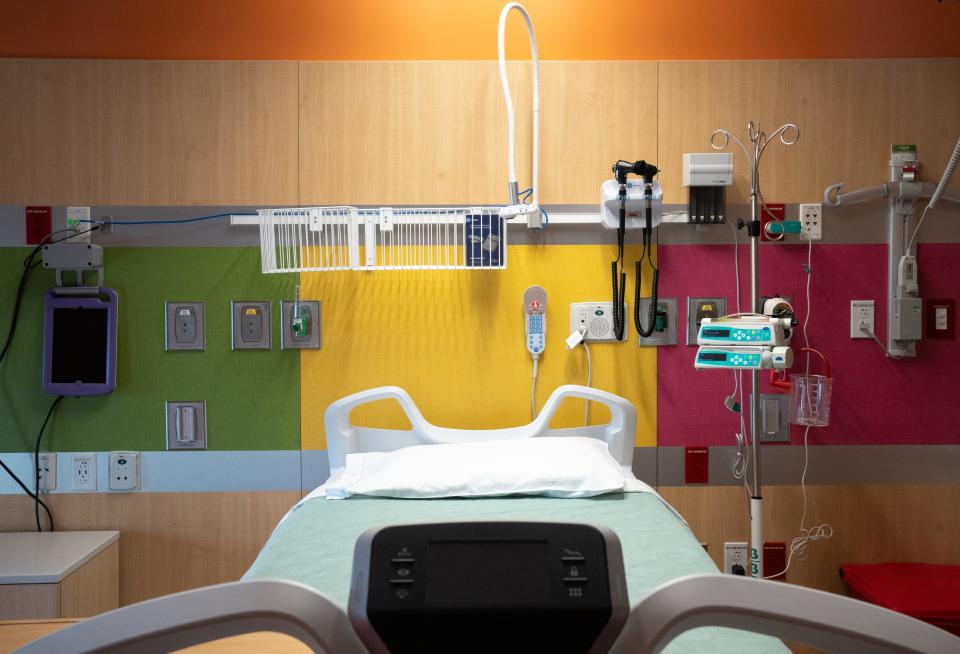Arizona ranked 37th in U.S. News & World Report's best states report
Arizona ranked 37th out of 50 states in U.S. News & World Report's annual Best State's Ranking, released early Tuesday.
The report used survey data to measure how each state ranked in 71 metrics across eight overall categories, including education, healthcare and economy.
The Grand Canyon State was out-ranked by two of its neighbors at the Four Corners in the overall score category, with Utah boasting its place as Best State title nationally. Colorado was ranked 15th, while New Mexico was toward the bottom at 47th place.
The rankings aimed to demonstrate how well each state served its population in a variety of ways, with overall opportunity and fiscal stability making up two of the categories, according to U.S. News & World Report.
Each of the eight categories was assigned a different weight in the overall score based on data averages from national surveys that asked nearly 70,000 people total to prioritize each subject category in their state.
"Three yearly surveys asked Americans how satisfied they were with various state government services and where they thought their state governments should focus resources," the U.S. News survey report said.
The surveys were administered over the course of three years, with the most recent data reflecting 2020-2021, the news outlet said. The results were weighted to represent the country's population across all ages, genders, ethnicities and household incomes.
Health care and education were weighted the most heavily, followed by state economies, infrastructure and the opportunities afforded to citizens. Each category had individual sub-categories to help determine its rank.
See how Arizona ranks in all eight categories, from most to least importance in the overall ranking:
Arizona is 45th in education

Arizona was ranked No. 45 out of 50 states in overall education. The report looked at higher education and Pre-K-12 as sub-categories.
The state fared slightly better in higher education taking 33rd place, but worse in Pre-K-12 at 48.
Arizona had a 77.3% graduation rate, compared to a national average of 86.5%, according to U.S. News. The average graduation debt for higher education was slightly below the U.S. average, at $24,298, while NAEP math scores in the state were 271, according to the report.
Florida was first in overall education. New Jersey was No. 1 in Pre-K-12 education.
Health care: Arizona ranks 24th

Arizona was ranked No. 24 in overall health care. The report based the score on the average of three sub-categories, which included health care access, health care quality and public health.
Though 46th in health care access, the state made up for it in health care quality at ranked fifth. Arizona was 27th in the public health sub-category.
There is 14.7% of Arizona's population without health insurance, compared to a national average of 12.2%. Arizona had 1,954 preventable hospital admissions, below the U.S. average of 2,781. The state's obesity rate was 31.4%, according to the report.
Hawaii was first in the overall healthcare category and in the public health sub-category. Rhode Island took the second spot in healthcare nationally.
Arizona's economy ranked 5th
Arizona ranked No. 5 in overall economy. The score was based on the average of a business environment sub-category, an employment sub-category and a growth subcategory.
The state was ranked 14th in business environment, 15th in employment and fourth in growth. Job growth was well above the U.S. average at 2.1%, compared to 0.2% for the rest of the country, according to the report.
Arizona's venture capital per GDP was $2.31 per $1K GDP, falling below the national average of $7.65 per $1K GDP. The state's net migration was 1.0%.
Utah took home another top title in economy, synonymous with its best state overall score. Idaho came in at second, followed by Colorado at third.
Infrastructure in Arizona is 17th in nation
Arizona ranked 17th in overall infrastructure, based on the average of scores from sub-categories including energy, internet access and transportation.
The state was 13th in energy, 19th in transportation and 23rd in internet access. The report said 22.5% of Arizona's roads were in poor condition, compared to a national average of 19.0%.
The average commute time on a bicycle in Arizona was 24.8 minutes. Arizona had an 11.8% rate of renewable energy use, compared to the U.S. average of 12.3%.
Minnesota is top in infrastructure, followed by North Dakota in the No. 2 spot and Oregon is third.
State is 39th in opportunity

The Grand Canyon State ranked 39th in the opportunity category, based on the average scores of affordability, economic opportunity and equality sub-categories.
The state did not boast a high ranking in equality, at 45th out of 50 states. Affordability was placed at 32nd, while economic opportunity was ranked 27th.
The poverty rate in Arizona was right on beat with the national average, at 12.8%. The state's median household income was $69,056, while the cost-of-living index was 96.7, according to the report.
New Hampshire was first in overall opportunity, followed by Vermont then Iowa. Delaware was first in the equality sub-category.
Fiscal stability of Arizona ranked 34th
Arizona was ranked 34th in fiscal stability nationally, based on the average scores of two sub-categories including long-term fiscal stability and short-term fiscal stability.
The Grand Canyon state was given an AA1 government credit rating, with a state-wide liquidity rate of 2.5, compared to the U.S. average of 3.6, according to the report.
Utah again swept the competition with the top rank in fiscal stability. Idaho took second followed by South Dakota.
In U.S., Arizona ranks 38th in crime & corrections

Arizona was 38th of 50 in the national crime and corrections category. The sub-categories included public safety and corrections outcomes.
The state was 40th in public safety and ranked 21st in corrections outcomes. The adult incarceration rate was 453 out of 100,000 residents, according to the report. That rate is 153 higher than the U.S. average of 307 adults per 100,000 residents.
The juvenile incarceration rate was lower than the national average, at 36 juveniles per 100,000 residents. The violent crime rate was 485 per 100,000 residents, again higher than the U.S. average of 399 per 100,000 residents.
New Hampshire topped the leaderboard again at best in crime & corrections. Maine was second overall, but first in the public safety sub-category. Vermont was third in overall crime & corrections.
Arizona's environment ranked low, at 43rd
Arizona was ranked 43rd out of 50 states in overall natural environment. The score was made-up of averages from an air and water quality sub-category and a pollution sub-category.
The Grand Canyon State was second-to-last in national air and water quality. It was 27th in pollution.
The state had more than double the U.S. average of days with unhealthy air, at 228 days out of 365. The national average was 114 days, according to the report.
Arizona had 2.44 drinking water violation points per 100,000 residents, above the U.S. average of 1.91 drinking water violation points.
The state with the best overall natural environment score? Hawaii. The Aloha state was best in the air quality sub-category. New York took the second spot, followed by Massachusetts at third.
This article originally appeared on Arizona Republic: Arizona 37th in nation, according to U.S. News & World Report
